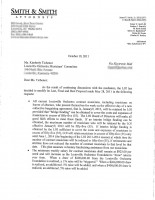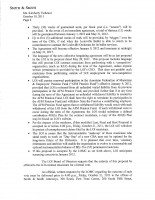UPDATES: 10:40am CT, Musicians Reject Offer | 11:00am CT, Management’s “Final” offer letter leaked – According to an article by Elizabeth Kramer in the 10/20/2011 of the Louisville Courier-Journal, the Louisville Orchestra (LO) has issued one more variation in a string of “final” offers to its musicians for a new collective bargaining agreement (CBA). Based on Kramer’s report, it looks pretty much like all of their previous offers.
 There are reportedly no substantive changes in this revision other than a tacit agreement to hire a few additional musicians, albeit it temporarily and only if the organization raises a certain amount of funds by January, 2012. Likewise, the agreement insists that the LO must be excused from any and all existing financial obligations and penalties it owes to the American Federation of Musicians Employee Pension Fund (AFM-EPF).
There are reportedly no substantive changes in this revision other than a tacit agreement to hire a few additional musicians, albeit it temporarily and only if the organization raises a certain amount of funds by January, 2012. Likewise, the agreement insists that the LO must be excused from any and all existing financial obligations and penalties it owes to the American Federation of Musicians Employee Pension Fund (AFM-EPF).
The LO has set a deadline of today, Friday October 21, 2011 at 4:00pm ET for the offer to be accepted and according to early reports if the musicians refuse, the LO will “[sws_css_tooltip position=”center” colorscheme=”rosewood” width=”450″ url=”” trigger=”begin the process of hiring permanent replacements for its musicians” fontSize=”12″]See page #3 of LO Management’s “Final” offer letter below in the update section. [/sws_css_tooltip]” outside a CBA. However, that will be easier said than done as the LO is currently on the AFM Unfair List.
In a similar move, the Kentucky Opera, which shares administrative and strategic resources with the LO, has broken off contract negotiations with musicians for upcoming performances with musicians.
As it stands, the 4:00pm ET deadline would violate the minimum amount of time required by typical musicians’ bylaws for members to review proposed terms, discuss in a group meeting, and then take a ratification vote.
If this weren’t enough, the LO and its musicians have been at odds over whether or not the musicians are on strike or locked out [sws_css_tooltip position=”center” colorscheme=”rosewood” width=”450″ url=”” trigger=”strike or locked out” fontSize=”12″]A strike is the suspension of work as initiated by the employees whereas a lockout is initiated by the employer and bars employees from working. [/sws_css_tooltip]. Currently, the LO has been claiming that the musicians are on strike and have therefore filed repeated claims with this assertion to the Kentucky Office of Employment and Training so as to prevent the musicians from collecting unemployment.
Kramer’s article reports the LO will withdraw its claim if the musicians accept their terms by today’s deadline.
The letter, signed by the orchestra’s attorney, James U. Smith III, also states that if the musicians accept the offer on or before that time, the orchestra will withdraw its claim pending in Kentucky’s Office of Employment and Training that the musicians are on strike and should not be receiving unemployment benefits.
Check back throughout the afternoon as updates will be posted when they become available.
UPDATE: 10/21/2011 10:40am CT
The LO musicians issued a press statement formally rejecting management’s 4:00pm ET deadline offer (see below); likewise, the LO issued a press statement detailing their official offer (see below).
[sws_toggle1 title=”Louisville Orchestra Press Statement”]
Louisville Orchestra extends final contract that would employ all musicians willing to work
LOUISVILLE (October 20, 2011) – In an attempt to reach agreement with its musicians’ union, the Louisville Orchestra amended its latest contract proposal by offering to employ all salaried musicians willing to work, starting Jan. 9. The two sides had differed over the number of salaried musicians on contract, with 55 being the number of musicians that can be supported by the Orchestra’s reliable income, while the union has sought no fewer than 60 musicians on a permanent basis.
“We acknowledge the difficult position of a union electing to reduce its own membership, so this is our good faith effort to make a final attempt at reaching agreement,” said Robert Birman, chief executive officer of the Louisville Orchestra. “The contract allows all current musicians to retain their jobs in the near term, while addressing, over time, the core issue of ensuring that our expenses align with our income.”
Under the proposal, the size of the orchestra would be adjusted to 55 salaried players by June 2013 through voluntary attrition and retirement. “This represents a stretch by the board – one they are willing to make in order to get an agreement,” said Birman. “While we had planned to work our way up to 55 over time, the board is now saying that it will accept that result as an outcome so long as it is guaranteed within a reasonable timeframe. This will require substantial community support to achieve.”
The minimum weekly salary for musicians would also remain the same as the previous contract agreement under the current proposal at $925 per week with full health insurance benefits and life and instrument insurance provisions. In addition, a pension benefit is provided through either a multi-employer plan or a defined contribution plan.
Birman said the proposal will require the Orchestra to raise yet-to-be-determined “bridge funding,” but that the Orchestra’s management and board felt strongly about making the amended contract offer. “We want to move the Orchestra forward and return live symphonic performances to the community,” Birman said. “This contract will create a permanent sustainable basis for the future and we believe this fundamentally will motivate local support to build the needed short-term financial bridge.”
The proposal includes terms to gradually increase the orchestra’s performance schedule from 30 weeks to up to 35 weeks, contingent upon agreements with the Louisville Ballet for added performances, as well as pay raises provided adequate funds are available from the community endowment funds designed to support symphonic music. The proposal was submitted to the musicians on Thursday, Oct. 20, and requests formal response by 4 p.m. on Friday, Oct. 21.
If an agreement cannot be reached, the Orchestra stated that it will begin the process of hiring permanent replacements for its musicians. Current musicians will have first right of refusal for their positions. “We felt that it was important to make every effort to reach an agreement that was affordable and sustainable,” Birman said. “Replacement of our musicians will be a last resort.”
Other cities provide perspective Last week, the Philadelphia Orchestra, which is facing chapter 11 bankruptcy, came to an agreement with its musicians and local musicians’ union to both reduce the size of the orchestra and musicians’ pay. To become more financially solvent, the new contract in Philadelphia reduced by 10 the number of salaried core musicians. The average number of core musicians in comparable orchestras to Louisville is 55. As example, the Columbus (Ohio) Symphony operates with 42 salaried core musicians, the Naples (Fla.) Philharmonic with 49.
“The contract proposal we have made would put the Louisville Orchestra squarely within industry standards for cities in the same budget class as Louisville, and would provide a world-class orchestra to our citizens,” Birman said.
[/sws_toggle1]
[sws_toggle1 title=”Louisville Orchestra Musicians Reject Ultimatum”]
October 21, 2011
Louisville Orchestra Contract Threats Sharp; Contract Details Sketchy
The Louisville Orchestra’s musicians have said no way to their management’s Friday deadline to vote on a letter management sent that calls itself a contract proposal, at least until the orchestra’s lawyers define the management’s own obligations as completely as they have defined the punishments they’ll mete out to the musicians if they don’t agree.
The management’s 36-hour deadline comes many days after the musicians’ offer to perform the Louisville Orchestra’s traditional holiday concerts and the Louisville Ballet’s Nutcracker production without wages if the LO restores the health insurance benefits management cancelled last May. “The threats are very well defined.” said violinist Kim Tichenor, chair of the Louisville Orchestra Musicians Committee. “However, there is a stunning lack of any specifics when the management’s lawyer defines the rewards the musicians get for agreeing to this contract or even give them the confidence the board has any plan or the wherewithal to fulfill its obligations.”
The letter from management lawyer James U. Smith III, stated the institution’s offer for even its present musicians was contingent upon “bridge funding” the management will seek in “good faith.” If the undefined amount of that bridge funding is not found, the management would cut the number of musicians to 55. No matter what the orchestra’s economic fortunes during the next five years, the number of musicians would remain at 55 from May 2012 through May 2017.
And even this commitment is delivered with the caveat that any agreement “assumes voluntary fundraising assistance from our musicians.” Additionally, the contract proposal contains no mention of health insurance for the musicians.
“There are no specifics concerning who the orchestra will fire to reach 55 players, or indeed what instrumental positions the orchestra would consist of under their concept, or how they could handle production of the symphonic repertoire with the musicians who remain,” Tichenor said. “All we hear is ‘no, no, no’ to anything we propose. This proposal seems merely to underscore the LO management’s unwillingness to join the orchestra’s growth potential with Louisville’s economic progress.”
While the musicians’ rewards for approval of management’s proposal are sparse, according to Tichenor the management’s list of threats to the musicians is long and detailed. Smith’s letter further states the management’s offer is contingent upon the American Federation of Musicians withdrawing its legal actions to recover past unpaid contributions to the musicians’ pensions – an issue which the Musicians are not empowered to decide. “We are sure they know this, especially having spent upwards of $100,000 on lawyers to fight us, “Tichenor said.
Smith’s letter summarily states that if the musicians do not agree to the terms by 4 p.m. Friday, the orchestra will consider the musicians to be on strike, will continue their lawsuit to have the musicians’ unemployment benefits suspended and will begin hiring musicians to replace them. “We are not on strike and never have been,” Tichenor said. “We keep asking to play. Management has cancelled performances unilaterally against the community’s interests, and refused our offer to provide music for the holiday season.” Tichenor affirmed the musicians’ willingness to put an offer that was clear and complete to a vote of the orchestra. “However,” she said, “the management needs to partner with us to make this happen. They not only have to give us a comprehensive and comprehensible proposal, but they also have to give the musicians something that give them faith and hope in the institution. At the moment, all we’re being offered are threats.” [/sws_toggle1]
UPDATE: 10/21/2011 11:00am CT
A copy of the LO’s “Final” offer letter which was subsequently rejected by the LO musicians has been obtained from multiple, independent sources (tip: click the “expand to full size” icon in the top, left corner of the lightbox once the image opens to read a larger version of the letter).
[sws_toggle1 title=”Click to read a copy of the letter”]
[sws_3_columns title=”Page 1″] [/sws_3_columns]
[/sws_3_columns]
[sws_3_columns title=”Page 2″] [/sws_3_columns]
[/sws_3_columns]
[sws_3_columns_last title=”Page 3″] [/sws_3_columns_last]
[/sws_3_columns_last]
[/sws_toggle1]



I thought it would be nearly impossible for a Board and Management to surpass the “Detroit Standard” for making the worst of a bad stiuation. In this field one should “never say never” in such matters I guess.
If nothing else, the LO is adopting a similar approach to Detroit and Philly in that they have displayed little interest in moving from their initial positions regardless the outcome. Given that the boards in the other two orchestras managed to prevail in those disputes, there’s certainly a growing precedent toward encouraging entrenched positions.
However, the wisdom of adopting that course of action has yet to be demonstrated. Detroit is in just as dire of financial straits as before their work stoppage and Philadelphia’s agreement does anything but provide stability in the face of the expected litigation over its pension obligations.
I need to ask two silly questions that will brand me as a total outsider in response to something you said that made a very particular neuron in my head fire. What you said was:
” … there’s certainly a growing precedent toward encouraging entrenched positions.”
And the question that this has occasioned is the following: What is the honest likelihood that any board member of member of management will miss a car or house payment if an orchestra dissolves? What is the likelihood that a musician will miss a car or house payment if an orchestra dissolves?
In all fairness Janis, your questions don’t acknowledge the governance responsibility of board members. Board members do not participate in nonprofit organisations to draw a salary or earn revenue, so in that regard, it’s entirely different than how boards function in for profit organizations. Don’t forget, if the orchestra goes under, that means the staffers (by that I mean non executives) lose their jobs as well, not just the musicians.
I understand. But when it all comes down to it, in any situation, if you look at the people who will have those sorts of troubles versus those who will not if the whole shebang sinks, that is often all you need to know in order to predict who will be “entrenched” and where. This is a large-scale tendency in any organization.
I agree that this has become the new MO for managements in such situations. However it seems to be a bit shortsighted. Once the “deed is done” the BOD and management still have to work with the people they just extorted. In today’s non-profit enviorment donors will not look favorably on an organization that is at each others throats. For an organization to thrive, all the horses need to appear to be pulling the wagon in the same direction. Strife doesn’t sell.
I didn’t know that LO wanted a 5 year contract and language restricting non-LO musical employment for musicians until I read the letter.
As for the long section proposing the ability to withdraw from the AFM-EPF without penalty, isn’t the penalty a matter of Federal law for the PBGC and not a matter for local negotiation?
The part of the proposal that deals with pension is particularly troubling.
LOI seems to want free “in-n-out” privileges with the Pension Fund. LOI is willing to “pursue renewed participation” in the Pension, provided that it is released from any previous unfunded liability and that it can withdraw at any time without incurring any future unfunded liability.
From an employer’s point of view, the AFM Pension is much like a defined contribution plan for which the employer does not pay the expenses of administration. One of the ways it differs from a defined contribution plan, however, is that if an employer withdraws from the pension during a serious economic downturn, the employer is responsible to pay its share of underfunding (its portion of what is needed to return the fund to financial health) since its retirees and employees will continue to receive whatever benefits they have accrued to that point.
The LOI wants to escape this responsibility for both its past and future participation in the Pension. It wants to be able to say that it is providing pension benefits to its musician employees, without taking responsibility for those benefits. It wants a special “discount” on pension benefits, and it wants the other employers and musicians participating in the Pension to pay for that discount.
There is a question I have been dying to hear asked during the LO debates that hasn’t happened, so I will post it here in hopes that I might see a response.
The board insists that $1m must be cut from the orchestra budget. The most recent budget report from the LO shows just over 700k spent on guest artists and guest conductors. Why has no one suggested cutting this part of the budget, instead of focusing on cutting full-time jobs?
Ironically, Jody–back when the LO became internationally known for commissioning new music, they did just that. The idea was cutting the budget for big name guest soloists in lieu of commissioning new works by composers. During that heyday well over 150 compositions were commissioned, performed, and in many cases recorded (which is what brought the LO to international attention in the first place).
Granted, the orchestra also did drop down to a 50 member group as well. But that legacy and shrewd decision at least put the LO on the international map, if only for a bit.
Thanks for keeping us in the loop on these negotiations. I am curious as to how this is playing out in the local community. I think people are sick of contract disputes in general. Will they voice their displeasure at the box office when the dust settles?
thanks for the question Kevin; historically, attendance and donations do slide following a particularly ugly labor dispute. However, that can be mitigated sooner rather than later if the institution can manage to build a strong unified vision that has firm, and obvious support and buy-in from all stakeholders. The problems we’re witnessing in some of the recent disputes such as Detroit and Louisville, is the necessary conditions to bring about the latter are considerably off mark.
Due to the impasse, the Louisville Orchestra is now attempting to hire other musicians. Are there any cases in the country where management was successful in hiring other musicians to create a new orchestra?
Nothing comes close with an orchestra of this size.
With today’s declaration that the LO will seek to hire replacement musicians and set the orchestra size at 50 full-time players, the LO Board has clearly drawn a line in the sand for the AFM, since most, if not all, professional players are AFM members. There is clearly a sub-agenda being fought for by the Board that amounts to union-busting, which is consistent with current Republican doctrine, making it one more battle in that war. What we see in Louisville is that none of the traditional trade unions, which are usually called upon to stand with a local under attack, have stepped up in any way to support Local 11-637. This is due in part to the elitist image of the musicians, as well as the overall lack of any union presence among the sort of street players that trade union members would be familiar with here in Louisville. The earliest battle between the LO and its musicians several years ago resulted in the local being taken over by the national office, which essentially completed the transition of 11-637 to a orchestra players-only local (with a few old jazz cats hanging on.)